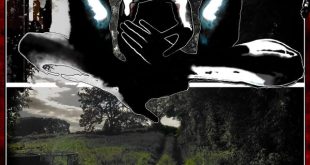 With their latest release, We Are the Halluci Nation, on the Pirates Blend label, the three-man DJ crew/producers known as A Tribe Called Red continue to redefine the music of the First Nations people of Canada. Already well-known for their inspired work mixing traditional native drum groups with dance beats, hip-hop, and electronics, the latest release expands on this base by reaching out to international indigenous and rap artists.
With their latest release, We Are the Halluci Nation, on the Pirates Blend label, the three-man DJ crew/producers known as A Tribe Called Red continue to redefine the music of the First Nations people of Canada. Already well-known for their inspired work mixing traditional native drum groups with dance beats, hip-hop, and electronics, the latest release expands on this base by reaching out to international indigenous and rap artists.
Aside from incorporating the Northern Voice and Chippewa Travellers drums, the crew (Ian “DJ” Campeau, Tim “2oolman” Hill, and Bear Witness) have used tracks contributed by artists as diverse as Inuit throat singer Tanya Tagaq, rap stars Yasiin Bay (Mos Def), Narcy, Black Bear, and Shad, and the voice of the recently deceased poet/musician/Native American activist John Trudell. It was Trudell who provided the lyrics for the title track and is the inspiration for the album as a whole.
So it’s only fitting the first voice you hear on the disc is Trudell’s. Before he died, he sent the band a tape of him reading the words for both the opening track and the release’s second last song, “ALie Nation”. It doesn’t take too much imagination to understand who Trudell is referring to when he talks about the “Halluci Nation” and the “ALie Nation”. Yet it’s not as cut and dried as the First Nations European division would have you think.
While the lyrics of the former makes no bones about the fact the song is about how indigenous people are viewed (“We are the Halluci Nation/We have been called the Indians/We have been called Native Americans/We have been called hostile/We have been called pagan/We have been called militant/…/We are the Halluci Nation.”), the latter implies that the split between peoples is not necessarily along racial lines. Rather, it’s between those who see the world as something to exploit and those who see it as something to celebrate.
While even that might be too radical a thought for most to get their heads around (after all, we’ve been taught we were given dominion over the beasts and the land), the band knows a message has to be delivered in a way to make it palatable. So on the majority of the tracks, the bitter pill of reality is sweetened with a musical mix that is not only infectious but brilliantly mixed. It seamlessly blends elements of traditional drums with electronics and the contributions of the guests.
“R.E.D.”, the track featuring Yasiin Bey, Narcy & Black Bear, is a great example of this. The core of the song’s music is a drum group laying down the beat. (If you’ve ever wondered why it’s called the heartbeat drum, you’ll understand after listening to this song.) Mixed over the top of it are the lead vocals and various electronic effects. However, what’s amazing is that instead of this creating an impenetrable wall of sound making the music sound like mush, you can hear every layer distinctly and how they work together.

On “R.E.D.” in particular you’ll notice how the song is built around the drum. During a drum’s performance there are various breaks from the heartbeat, either when the drum stops altogether and there’s only singing, or when the rhythm and speed are suddenly increased. On this track, we hear the same pattern, in both the drum and the other elements – from voice to electronics. It’s a perfect merging of the traditional and the modern.
There are two tunes, “Before” (track four) and “Soon” (track 15), which aren’t really songs. They are recordings of a phone conversation from prison. They are heartbreaking in their reality and pain and bring up topics which most people don’t really want to know about: the damage suffered by First Nations people in residential schools and the unsolved murders of thousands of indigenous women across Canada. Simple and direct, they go to the heart of what’s wrong with Canada’s relationship with the original people of this country.
I was fortunate enough to interview John Trudell about eight years ago. What I came to realize from reading his poetry and talking with him is how much your mindset is changed by living as a conquered people in your own land. I could barely even begin to get my mind around how that must feel. We Are the Halluci Nation from A Tribe Called Red explores similar territory while at the same time trying to show all of us there is a way forward from this state of mind.
Musically, this CD will knock your socks off, as it blows a hole in your sternum and gets your feet moving. It will do the same thing to you intellectually and emotionally if you let it. That’s the power of great music.
 Blogcritics The critical lens on today's culture & entertainment
Blogcritics The critical lens on today's culture & entertainment



